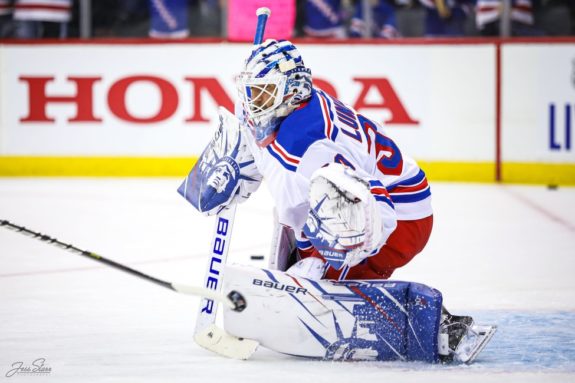The 2000 NHL Draft was a big one for the Minnesota Wild. After all, it was the first in the franchise’s history and its effects were felt within the organization for years to come.
With the expansion draft behind them, the Wild entered the 2000 NHL Draft with nine total draft picks across the first eight rounds. Doug Risebrough was the general manager heading into the draft, having served in the same position for the Calgary Flames in the past. The team also had Stanley Cup-winning head coach Jacques Lemaire behind the bench, showing how important it was for the organization to be successful as soon as possible. Both men went on to spend nearly a decade with the Wild, having moderate success along the way.
When all was said and done, the team had a decent showing at the 2000 NHL Draft. Their top two selections went on to have successful NHL careers where they played over 1,000 games apiece, but the rest of the club’s selections left a lot to be desired. Keeping that in mind, here’s a look at each of those draft picks.
Early Rounds (1st and 2nd)
Round 1, 3rd Overall – Marian Gaborik, RW (Trencin Dukla, SVK)
Marian Gaborik is easily one of the best players in Wild history, as well as one of the top options in the first round of this draft class. In his last season before the draft with Trencin Dukla of the Slovak Extraliga, he scored 25 goals in 50 games, showcasing his scoring ability before he even made it to the NHL. He also won a bronze medal with Slovakia at the IIHF World Juniors and U18 World Championship in 1999. Obviously, his talents impressed Wild scouts enough to be the first pick in franchise history. Fortunately for fans, Gaborik didn’t disappoint, scoring 18 goals and 18 assists as a rookie through 71 games.

Gaborik became an instant fan favourite in Minnesota, dazzling the crowd with his goal-scoring abilities. In eight seasons with the Wild, he scored 30 or more goals five times, including when he set the franchise record for most goals in a season with 42 in 2007-08. Unfortunately, the hockey world may never know what his true scoring potential was as injuries plagued him throughout his career. Out of a possible 656 regular-season games he could’ve played for the Wild, he wound up missing 154 of them.
Nevertheless, Gaborik still had a successful time with the Wild, finishing with 502 games played with 219 goals and 218 assists for 437 points. To this day, he still has the most goals in franchise history, with Zach Parise being the next closest active Wild player on the list at 199. The fact that Gaborik still holds the record despite not having played for the team in over a decade shows just how good he was in his prime. He went on to play with the New York Rangers, Los Angeles Kings, Columbus Blue Jackets and Ottawa Senators before ending his career.
Round 2, 33rd Overall – Nick Schultz, D (Prince Albert Raiders, WHL)
Just as they did with their first pick, the Wild found another player who wound up spending around a decade with the organization. While playing with the Prince Albert Raiders in the Western Hockey League (WHL), Nick Schultz was a solid two-way defenseman, scoring 114 points in 189 games. After being drafted 33rd overall, he went on to play another season in the WHL and four games for the Cleveland Lumberjacks in the International Hockey League before making his pro debut in the 2001-02 NHL season. With the Wild, Schultz became more of a defensive defenseman for the rest of his career.

Schultz played an incredibly physical game, finishing his time with the Wild with 549 hits and 980 blocked shots, which rank third and second, respectively, among franchise records for defensemen. He was also an alternate captain towards the end of his tenure in Minnesota, showing that he was a leader both on and off the ice. At the 2012 Trade Deadline, the Wild shipped Schultz to the Edmonton Oilers in exchange for defenseman Tom Gilbert. He was the last player from his draft class playing on the team before the trade. He also went on to play for the Blue Jackets and Philadelphia Flyers before calling it a career after the 2016-17 season.
Middle Rounds (3rd – 5th)
Round 4, 99th Overall – Marc Cavosie, W (Rensselaer Polytechnic Institute, ECAC)
To say that Marc Cavosie’s professional hockey career was a bit disappointing would be a bit of an understatement. The Wild drafted him at No. 99 in the fourth round, so it’s not like there were a lot of expectations on him. However, he did look impressive in his college rookie season for the Rensselaer Polytechnic Institute, racking up 30 points in 33 games.
Once he wrapped up his time at R.P.I., he made his American Hockey League debut with the Houston Aeros in the 2002-03 season and helped them win the Calder Cup. Cavosie went on to spend three seasons with the Aeros, finishing with 18 goals and 52 assists in 189 games. Unfortunately for him, the Wild never called him up and he’d spend the rest of his career bouncing around the AHL and ECHL with the occasional excursion to Europe. He has since returned to R.P.I. and serves as an assistant coach for their men’s hockey team.
Round 5, 132nd Overall – Maxim Sushinski, RW (Omsk Avangard, Russia)
While the Wild’s first three picks of the 2000 NHL Draft were relatively young, the team went older in the fifth round by drafting 25-year-old right wing Maxim Sushinski out of Omsk Avangard in Russia. He had spent the eight previous seasons playing in Russia, which gave him a lot more experience competing against men than most of the other draftees. Disappointingly, he played just 30 games for the Wild, all in the club’s inaugural season. He’d have 11 points during his tenure, but he ended up leaving the team in the middle of the season to return to Russia for personal reasons. He never returned to the NHL, finishing out his hockey career in his homeland.
Late Rounds (6th – 8th)
Round 6, 170th Overall – Eric Reitz, RW (Barrie Colts, OHL)
Eric Reitz was never expected to be a flashy, mobile defenseman. He was more known for his toughness and ability to get physical. In three seasons with the Barrie Colts in the Ontario Hockey League (OHL), Reitz racked up an astounding 416 penalty minutes. He’d make his professional hockey debut for the Aeros during their Calder Cup-winning 2002-03 AHL season. Even in the AHL, Reitz couldn’t resist staying out of the box, recording 721 penalty minutes in 363 games with the Aeros.
Reitz eventually made his NHL debut in the 2005-06 season, playing five games while recording no points and four penalty minutes. He only played 37 games with the Wild in his career before being traded in January 2009 to the New York Rangers for Dan Fritsche. Reitz finished his hockey career after playing two seasons in Europe following the 2008-09 season.
Round 7, 199th Overall – Brian Passmore, C (Oshawa Generals, OHL)
Despite being drafted in the seventh round, Brian Passmore was actually pretty impressive for the Oshawa Generals in the 1999-2000 OHL season. He was a point-per-game player, scoring 58 points in 58 games. He was also the first center that the Wild drafted in franchise history, so it would’ve been nice if he managed to become somewhat of a role player for the team. Unfortunately, that wasn’t the case as he never played a game for the organization. After playing another season in the OHL, Passmore spent two seasons playing for the University of Prince Edward Island’s hockey team. Most of his time after that was spent on five different ECHL teams with some time in Europe as well.
Missed Opportunity: New York Rangers select Henrik Lundqvist, G (Chicago Steel, Sweden) – 205th overall
Just six picks after the Wild took Passmore, the Rangers drafted a Swedish goalie by the name of Henrik Lundqvist. Obviously, nobody knew just how good he would become, but the fact is that the Wild could’ve used him on the roster. In their inaugural season, Jamie McLennan and Manny Fernandez were the club’s top goaltenders. While both of them had decent NHL careers, neither had one as good as Lundqvist’s.

While uncertainty surrounds his future, not many goalies have accomplished what Lundqvist has. When it comes to all-time goaltending statistical categories, he ranks sixth in wins (459), tied for 10th in save percentage (.918%), and 18th in shutouts (64). He’s also won Vezina Trophy in 2012 and was a part of multiple all-star teams. With how durable and successful Lundqvist has been, it’s not hard to wonder how he could’ve changed the Wild’s history if they selected him instead of Passmore.
Round 7, 214th Overall Peter Bartos, C (Ceske Budejovice HC, Czech)
For some reason, the Wild liked drafting older players in 2000. With the 214th selection in Round 7, the organization drafted Ceske Budejovice HC’s 26-year-old Peter Bartos. To his credit, he was coming off back-to-back 48-point seasons in the Czech Republic and that played a role in him making his pro debut in the Wild’s inaugural season. His impact was limited though as he only played 13 games, putting up six points.
He spent most of the 2000-01 season with the Cleveland Lumberjacks in the IHL and looked impressive as he scored 46 points in 60 games. Unfortunately, that was it for the Wild and Bartos’ relationship. He’d return to Ceske Budejovice HC in the following season and continue playing hockey across the Czech Republic and Slovakia until retiring in 2017.
Round 8, 232nd Overall Lubomir Sekeras, D (Trinec Ocelari HC, CZECH)
For some reason, the Minnesota Wild couldn’t stay away from drafting another older European player when they selected 31-year-old defenseman Lubomir Sekeras from Trinec Ocelari HC in the Czech Republic. By the time he was drafted, Sekeras had 12 professional hockey seasons under his belt and slid into the Wild’s defensive rotation right away. In the franchise’s inaugural season, he finished with 34 points in 80 games. He went on to play another two seasons with the team, but his biggest moment came in the 2003 Stanley Cup Playoffs.
With the Wild down 3-2 in their 2003 Western Conference Semifinal series with the Vancouver Canucks, Sekeras stepped up big in Game 6, scoring his first and only NHL postseason goal. It ended up being the game-winning goal, helping the Wild force a Game 7 that they went on to win. His time in the league came to an end sooner after that. He signed with the Dallas Stars in the 2003-04 season, only to play four games before returning to Europe, where he played until his 2011 retirement.
Round 8, 255th Overall Eric Johansson, C (Tri-City Americans, WHL)
By drafting Eric Johansson in the eighth round, the Wild took their third center in their final four selections. He was coming off of a WHL campaign that saw him record 60 points in 72 games for the Tri-City Americans. He remained in the juniors for two more seasons, improving his point totals to 80 and 103, respectively. However, Johansson never ended up signing with Minnesota and opted to re-enter the draft.
He slightly improved his draft position, getting selected 187th overall by the New Jersey Devils in 2002. After playing three seasons in the AHL and one in the ECHL, Johansson’s North American hockey career was over. He’d find himself playing for 11 different European teams before hanging up his skates in 2018.
Overall Grade: C
Gaborik and Schultz were really the only important players that the Wild walked away with at the 2000 NHL Draft. Fortunately, they both had pretty good careers for the Wild for the first part of the 2000s and are still remembered fondly to this day. It’s because of Gaborik and Schultz that this grade is as high as it is. The rest of the Wild’s picks that year barely played any NHL games and a lot of them were too old to have lengthy NHL careers. However, the entire draft class was on the weak side anyway, so some could make the argument that the Wild were just playing with the hand that they were dealt.
woul
As a lifelong hockey fan and recent Master of Journalism graduate, it’s always been my dream to write about the sport. That’s why you can find me here on THW covering the Minnesota Wild! You can find previous bylines on the Ottawa Citizen, Capital Current and various sports betting websites.
